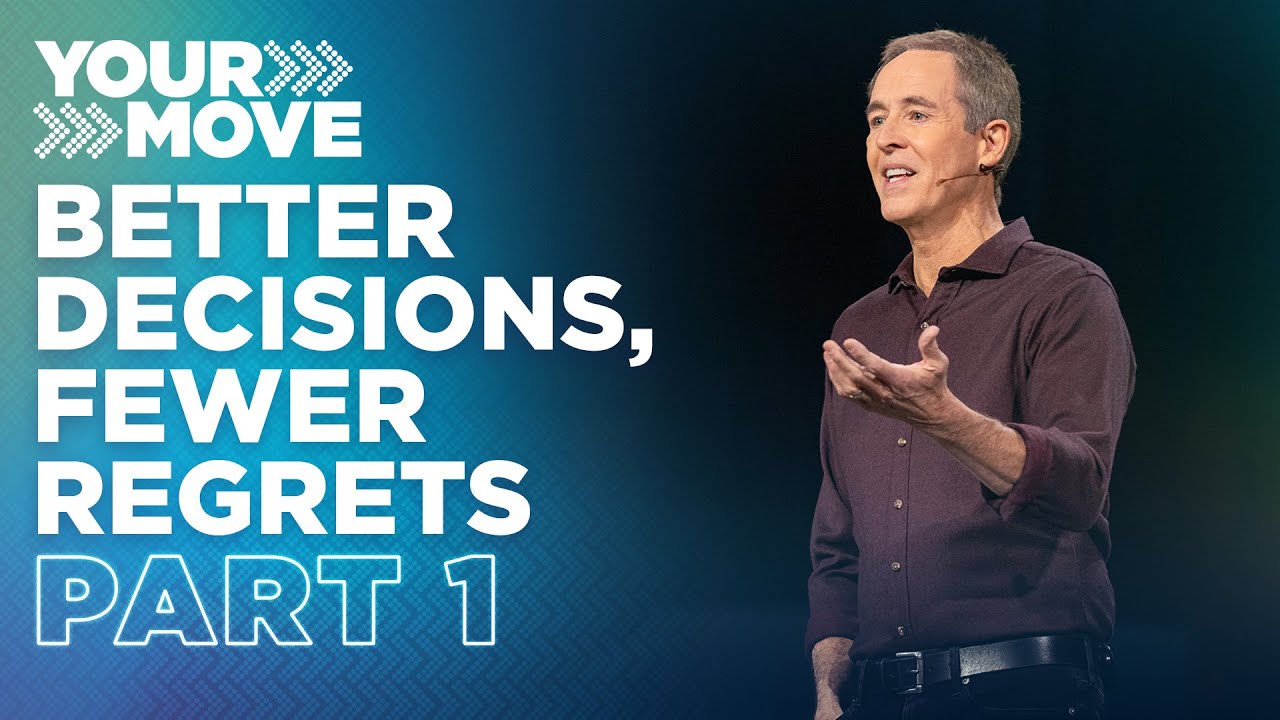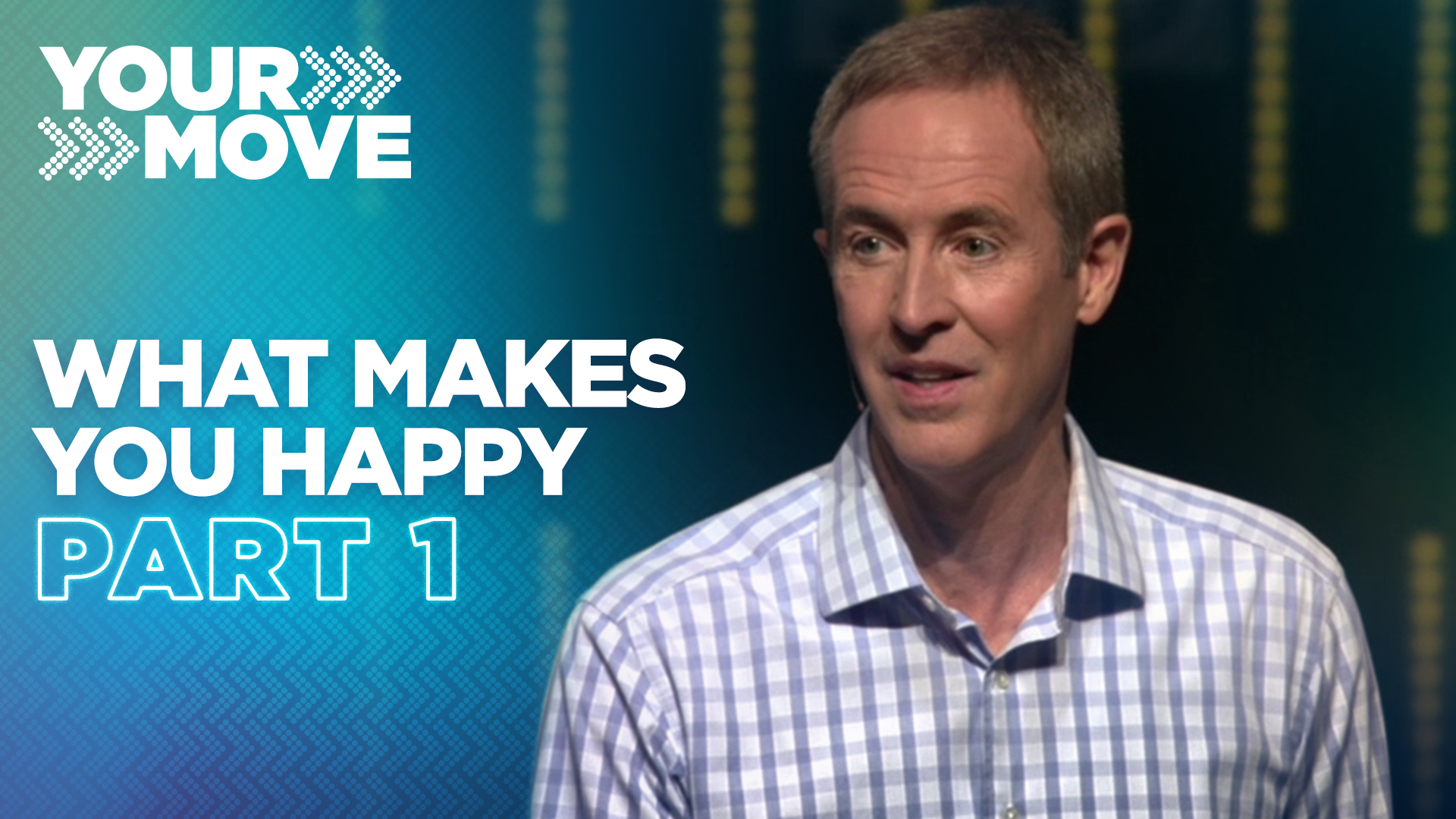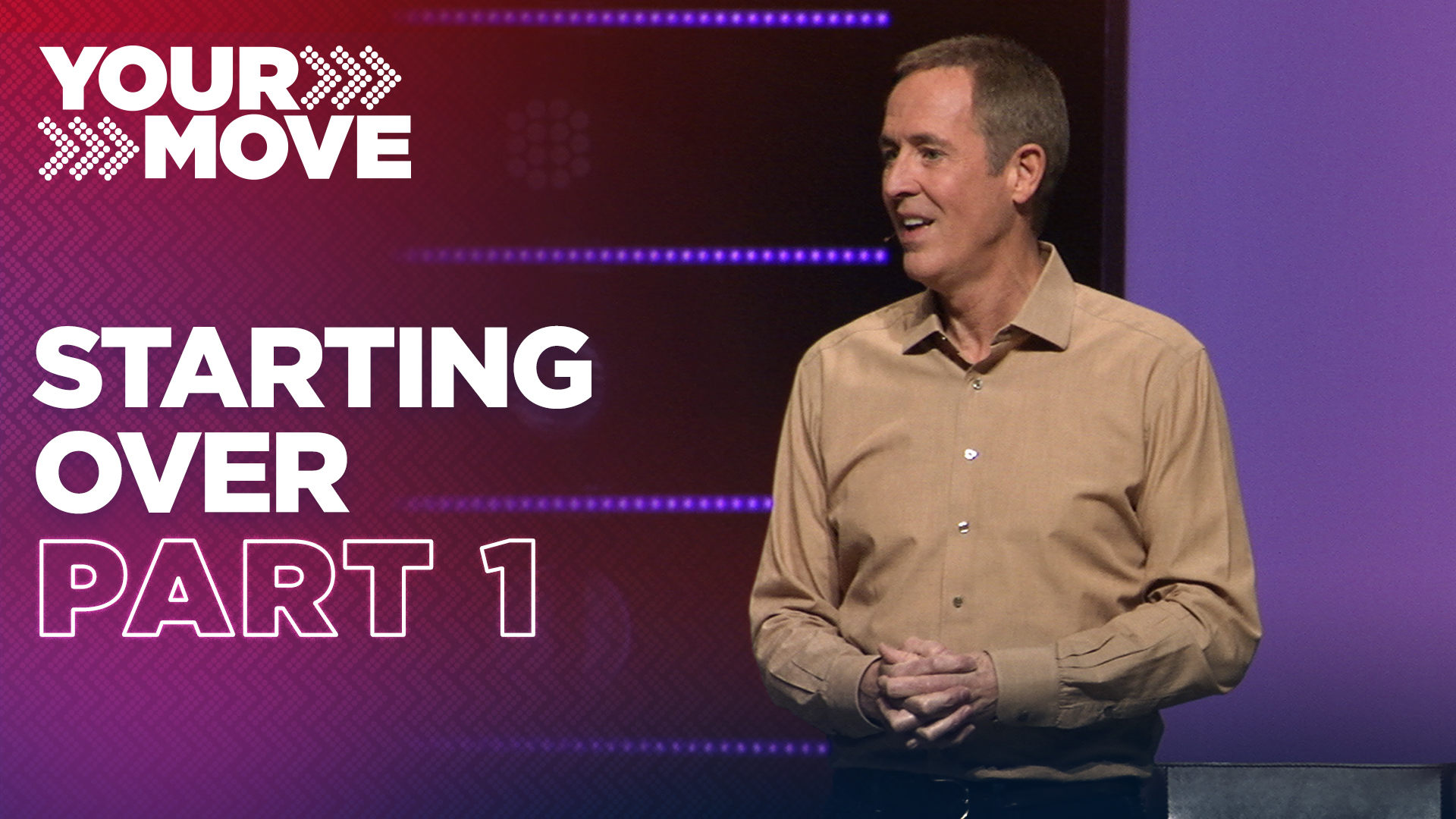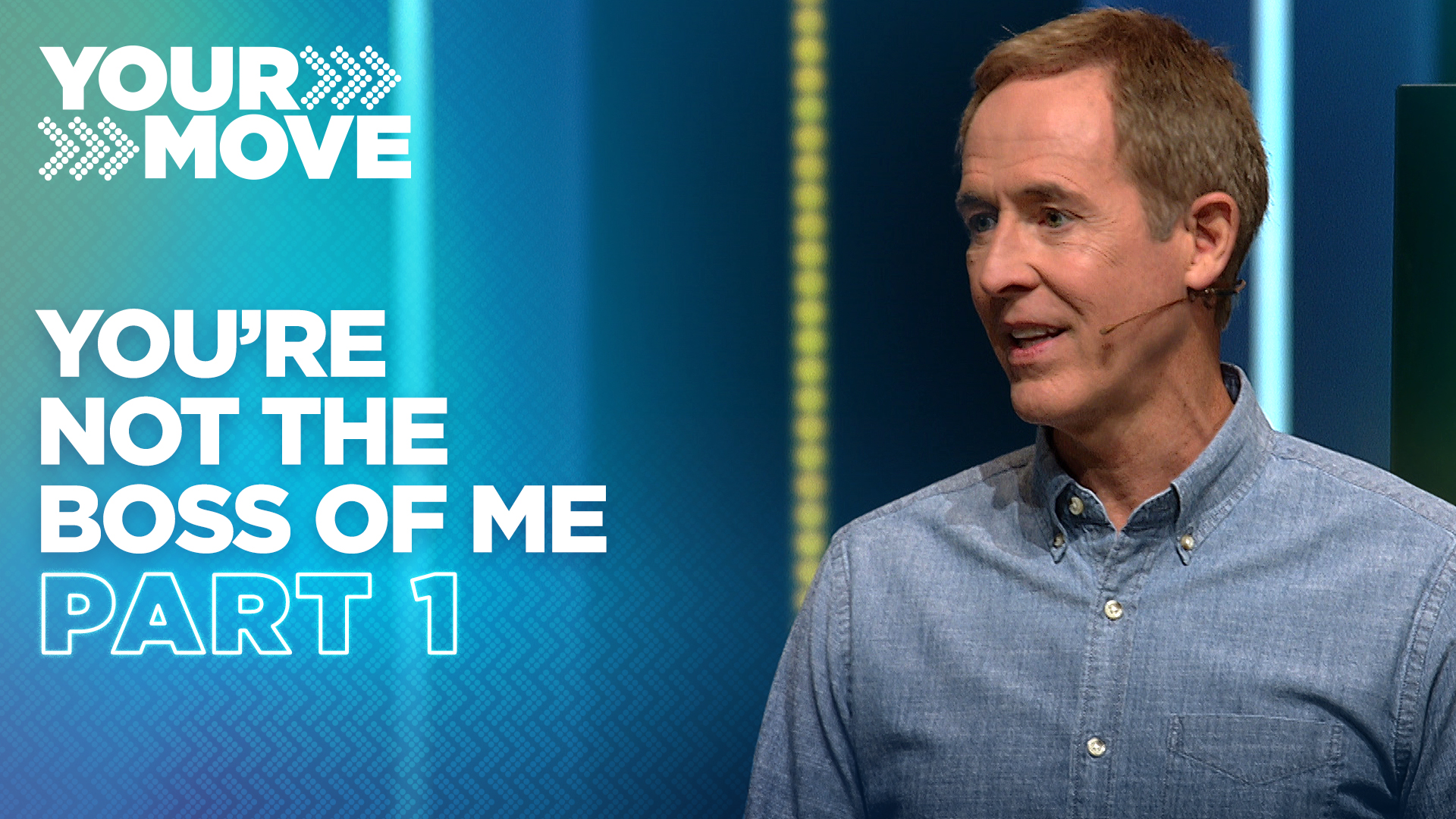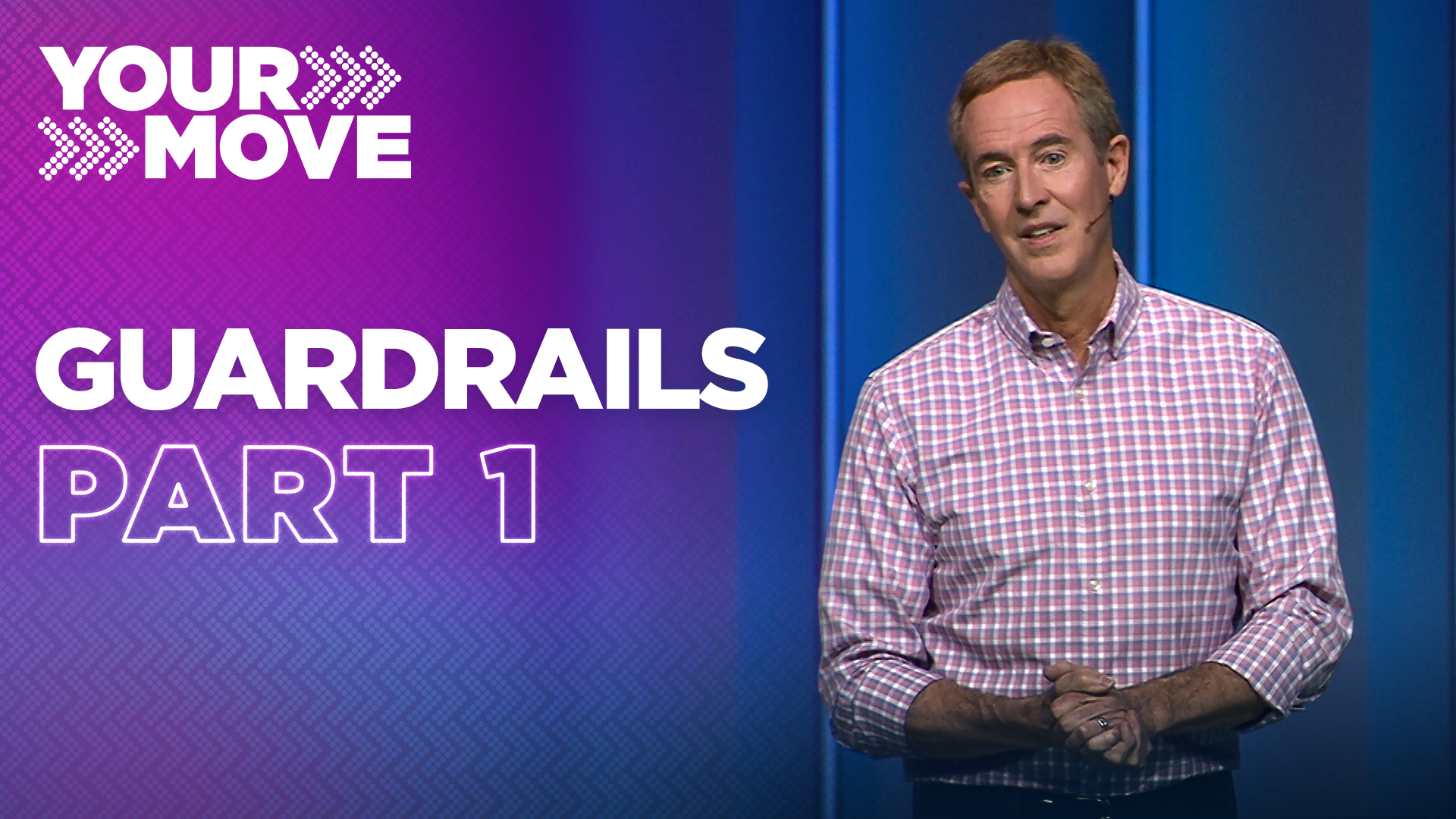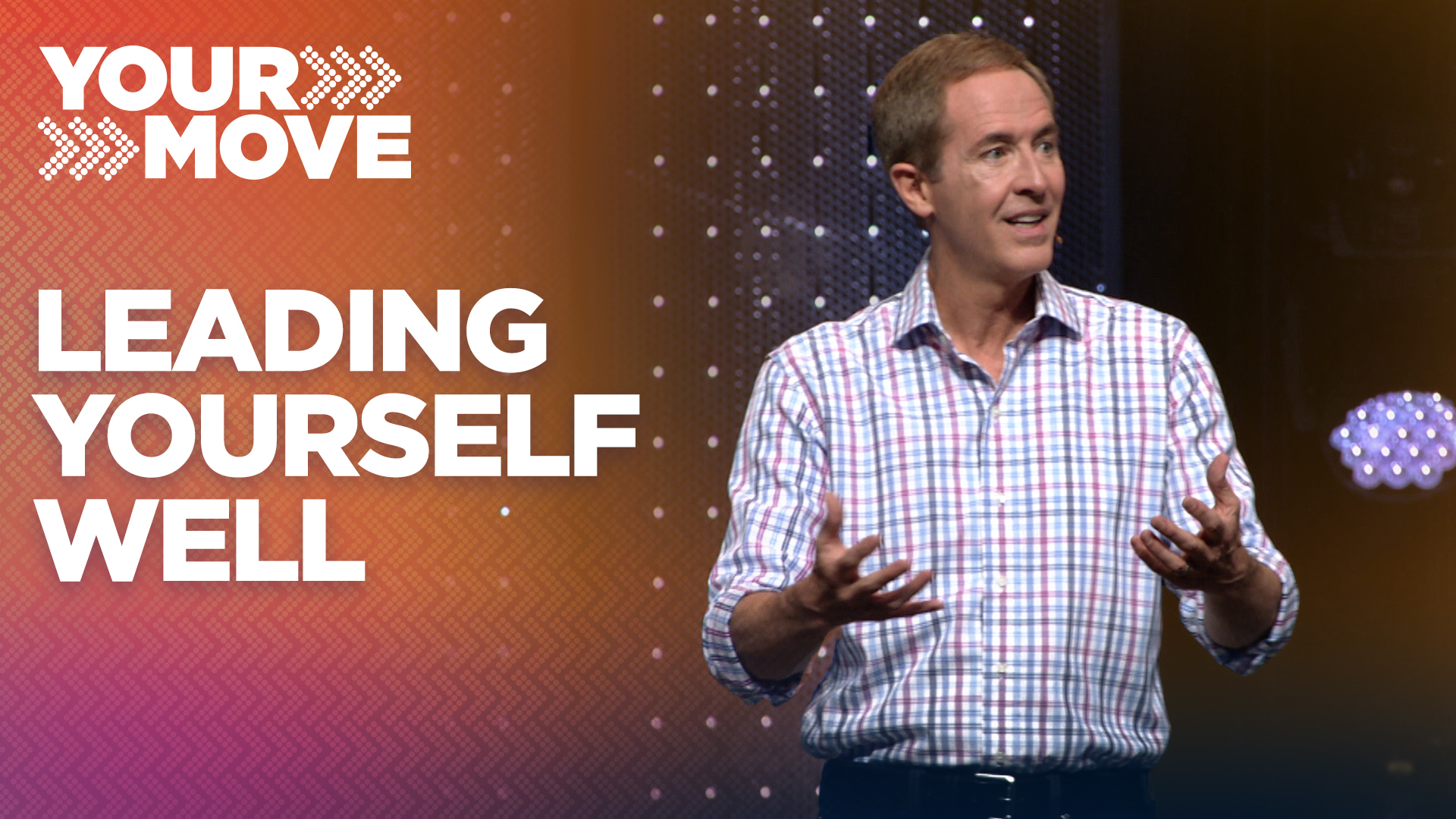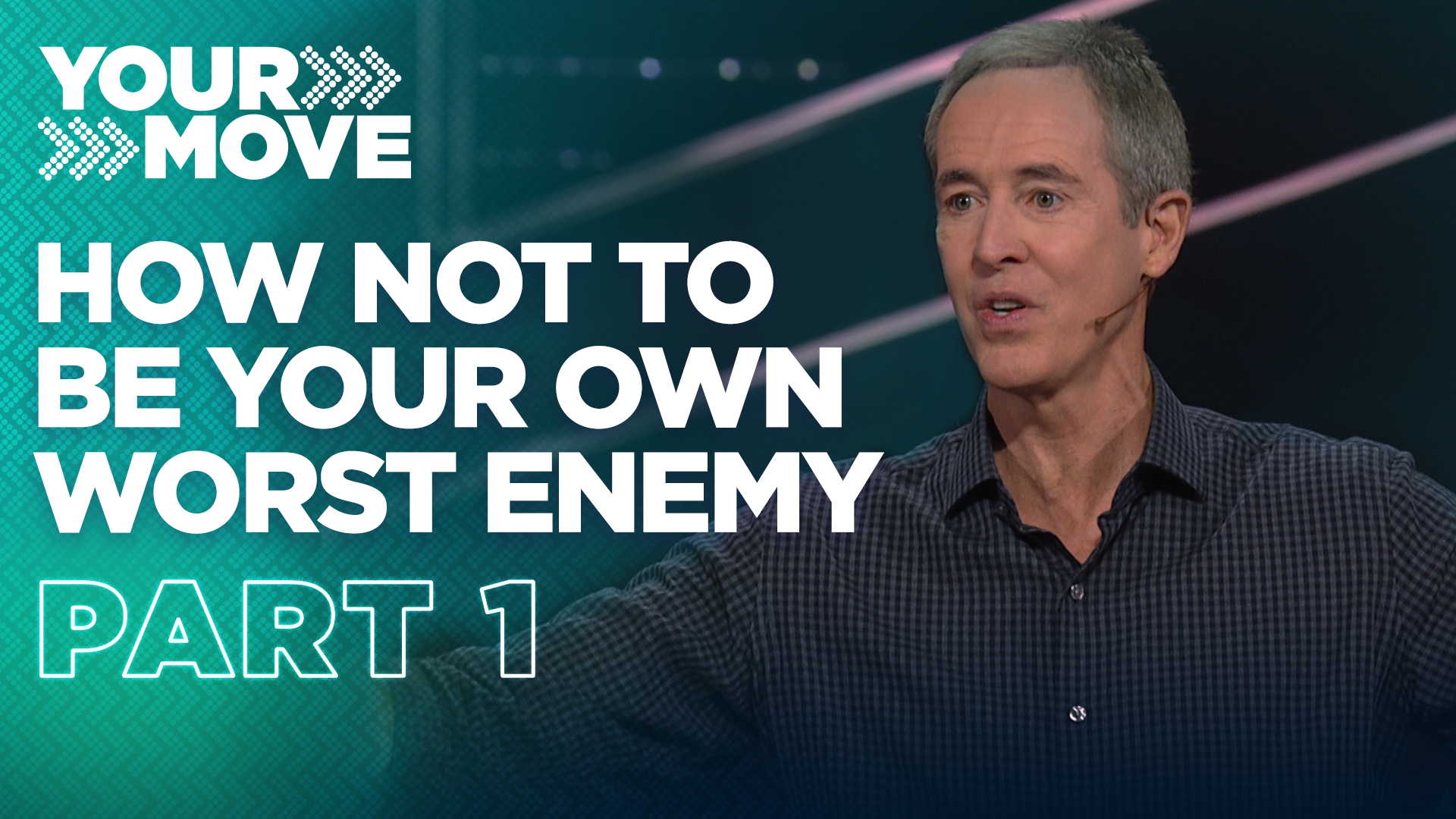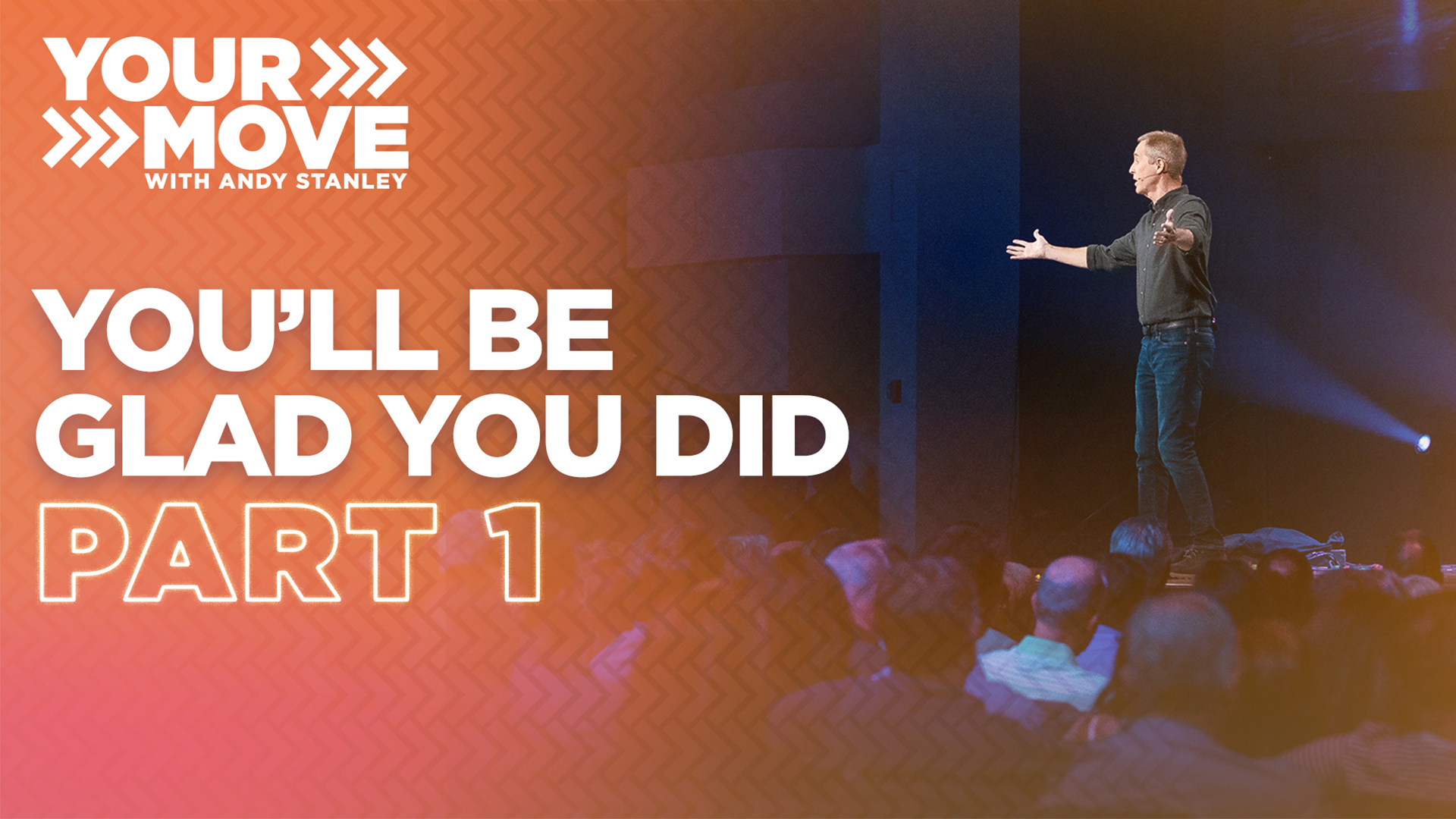We can talk ourselves into anything. Our internal narratives justify our beliefs as well as our actions. But when those narratives aren’t true, how do we replace them?
- Did you grow up with an internal narrative you had to correct later in life? How did you discover that it was flawed?
- Currently, are there any destructive narratives you find yourself believing about yourself or others? Where did they come from?
- Andy mentioned that following Jesus means embracing a new narrative that informs our consciences and behaviors. How does this idea land with you?
- Name one narrative you need to replace. How does it contrast with the value system established by Jesus?
NOTE: The following content is a raw transcript and has not been edited for grammar, punctuation, or word usage.
Isn’t it strange? I don’t know if you even think about this, but because I have to talk all the time, I have to think of things people aren’t thinking about, so I can make you think about it, so I’ll have something to talk about; that’s kind of my life, basically.
[laughter]
Isn’t it strange how we talk to ourselves because we all do this. We have conversations with ourselves. There’s two of us in there, sometimes three; if you have four, I don’t really wanna meet you. But anyway…
[laughter]
Anyway, so these conversations that we have with ourselves eventually we get down to this really, really big question that we all wrestle with and this question is, “Why?” And here’s what we do. Something happens and we think, “Why did that happen? Then we go to work trying to figure out why it happened, and why did this happen, why did that happen, why did this happen, rather than that, and this is what I thought what happened but this happened. And you can’t help it, this is so human nature. We have this extraordinary habit, this inclination to impose a reason on randomness. We impose a reason on randomness. Something happens that doesn’t make sense and our minds just go to work trying to make sense out of randomness. And what we do is we create a narrative, we create our own narrative to, basically, to make sense of things; we create a narrative to make sense of things.
In fact, the worse the incident and the more personal the incident, the harder you work and the harder I work to make sense out of that because what’s undeniable, regardless of your world view, what’s undeniable is that we create and often abide by our self-imposed narratives, whether they are accurate or not, whether they reflect reality or not, and this can be a problem. This can be a problem. In fact, this can lead you as you have already experienced in your life. This isn’t gonna be new, I’m just gonna put words around something you’ve already experienced. This can lead you to become your own worst enemy.
So today we are in part two of our series. If you were here last time, you already know this, How Not to Be Your Own Worst Enemy. Now, we’ve all been our own worst enemy, and in many cases, we can laugh about that season or that time in our life where we were our own worst enemy. But it’s not always funny, right? In fact, you’ve seen people, you’ve had friends or family members who kinda did it up big, like they were their own worst enemy in their marriage and blew up a marriage, blew up a career, blew up their health, blew up their financial stability.
And here’s what we think, here’s what I think I know this is what you think you think? You think, “I would never do that.” I mean watching it happen you think, “I would never let that happen to me.”
But you have the potential to do whatever you’ve watched anybody else do. And we said this last week, because the reason we know you have the potential, is because you have participated in all of your bad decisions. 100% of your bad decisions, you were there for all of them. In fact, you master-minded most of them; you were the mastermind behind most of them. And as we said last time, a single bad decision is always the first step toward becoming your own worst enemy. A single bad decision is always the first step toward becoming your own worst enemy. Every habit begins with the first time. Every pattern begins with a first line, Every journey begins with a first step.
So, in this series, I’m going to give you, I’m giving you three preemptive habits; three things we can all begin doing every day or every week to preempt or to keep ourselves from becoming our own worst enemy, to ensure that you don’t become your own worst enemy. Last week, I gave you habit number one. Habit number one was pay attention to the tension, pay attention to the tension. Whenever you’re considering an option, or a choice, or an invitation, or a date, or a business deal, or whatever it might be, if there’s something on the inside of you that’s kinda like hmm . . . pay attention. If something dings your conscience, pay attention. Ask the question, “Is there a tension that deserves my attention?
This week we’re gonna talk about preemptive habit number two. And preemptive habit number two is simply this, pay attention to your narratives. Pay attention to your narratives. Now, I just wanna make sure we’re all on the same page when it comes to narratives, so I need to take you back in time. Most of you, some of you were there. Now, I want you to think back to high school and I want you to think about your narrative, your internal narrative as it related to your parents. Remember how dumb they were. [laughter] Remember how uncool they were. Remember how they just didn’t get it. And then in your 30s, you looked back and thought. “Huh, they were smarter than I thought they were.” In fact, you didn’t even wait ’til you were in your 30s, you got to your 20s. Suddenly they got smarter and suddenly it didn’t matter that they weren’t so uncool, what happened? Well, you had a narrative, and in high school you lived by that narrative and that narrative got you into trouble.
Remember your high school narrative about school for many of you, “Such a waste of time, it’s such a waste of time, such a waste of time.” So maybe you’re young enough to where it was such a waste of time that you got your mobile device, you’re multi $100 mobile device that your loser parents bought for you.
[laughter]
That never occurred to you, did it? Did it? And you start texting your friends on this multi $100 mobile device to your friends, “School is such a waste of time. School is such a waste of time.” On a device created by people who went to school. [laughter] Alright, but that never occurred to you, right, because you had this internal narrative, and you believed it and you lived it out. And we still have those. We still have those. Here are some of the things that drift through our mind that shape our decisions. I’m just gonna go through a bunch of them real quick to try to make sure we’re all moving in the same direction today.
“I deserve better. I’m entitled to. I should be further along. I’m not happy. He should be… If she loved me… They don’t care. They don’t care. It doesn’t matter. It doesn’t matter how hard I try. Doesn’t matter if I have an idea. I’m not gonna tell him, it doesn’t matter. It won’t make any difference. It won’t make any difference. I don’t do exercise. I don’t think… You should exercise, but I don’t do that.” “I know, but you need to.” “But I don’t do that.” What does that even mean? It means I don’t do that.” [laughter] ” You mean you can’t do it?” “No, I don’t do it.” “Like you can, but you don’t know.” “No, no, no, I don’t do it.” “That doesn’t make sense.” I know it’s my story, I’m sticking with it.”
“I can’t. I’m better than that. I’m better than them. They’re losers. They’re just losers. The whole
category, they’re just losers. I don’t have to consider them. They don’t deserve, they don’t deserve that. If they would just try hard, you know what their problem is? They don’t try hard enough, they don’t work hard enough; that’s their problem. They just don’t work hard enough; they just don’t try hard enough. I can’t resist. I know I just can’t resist.” “Why?” “I just can’t resist.” “Why do you do this?” “I can’t resist.” “Why?” “I just can’t resist. Something’s wrong with me,” That actually may be true, but anyway. [laughter] Something’s wrong with me. I can’t live without… Republicans are all… Democrats are just… Men… ”
[laughter]
“Women are all… Baptist. The Catholics. If my dad had only… If my mom hadn’t… Southerners, ignorant redneck, guns. [laughter] What’s up with the southerners? Northerners, just go back to the north then, okay, if you don’t like it down here. Bunch of Northerners.”
[laughter]
Isn’t it amazing? And again, when you look at it, none of this is rational, none of this makes sense, but I’m telling you this kind of stuff and I could go on and on and on. It informs our narratives, it informs how we view and interpret the world when it comes down to, “I wonder why. I wonder why; it goes to stuff like that. Narratives create excuses. Narratives create justifications. They empower us to avoid things we should not avoid, and they empower us to embrace things we should stay away from. Our internal narratives, it fuels our pride, it fuels our racism, it fuels our prejudice, it fuels our fear, and maybe worst of all it blinds us to our interdependency on others. False narratives are difficult to overcome; they’re very, very, very difficult to overcome, and here’s why: Because our narratives are shaped by things that we have no control over. Our narratives are shaped by where we are in the world.
Also by the way we experience the world because you experience the world different than the person sitting behind you by the way. And in some cases, the person that you see at work every day, and the person that you pass on the highway, you’re in the same world, you’re in the same city, but you experience the world differently, and this shapes the narrative that we think about, that we live our lives in the context of. And obviously the way that we were raised, the way we were raised influences our narratives.
Success, failure, family, upbringing, the way we’ve been treated, the way we’ve been mistreated, where we live in the world, where we live in the city, what part of the city, our education, all of these things impact the things that we tell ourselves, our internal narrative. Now, a whole lot has been written on this topic, but here’s what you already know, I’m gonna illustrate it at the end again. Here’s what you should know. Your internal narrative, the thing that you just confirm and affirm and tell yourself over and over, it shapes your decisions, and it has the potential, as you’ve already seen when you think back to some of your decisions you made in childhood or high school or college, it has the potential to cause you to become your own worst enemy.
Here’s a really interesting kind of cool thing, the Apostle Paul, who as you know or if you are new to church, or new to Bible studies, the Apostle Paul steps into the pages of history as somebody who hates Christians, hates Christians. If you hate Christians, he’s your guy, except that he became a Jesus follower.
But part of his challenge is he’s going into these pagan cultures around the Mediterranean rim, these major port cities, and he’s trying to explain to them that God has done something in the world, which means that they are to embrace a completely different value system, the value system introduced by Jesus. And he writes a letter, one of his letters was written to Christians, Gentile Christians, non-Jewish Christians living in Corinth, this major very, very secular port city, very wealthy city, and in this letter, where he’s trying to get them to rethink their narratives, he employs, we’re gonna see, military terminology, which is interesting because he only does this a couple other times.
And at first, if you’re kind of anti-military or anti-violence or you’re thinking, “Oh no, where’s this going?” This is actually so appropriate because getting rid of or tearing down the narratives that we grow up and then live with, it is not a casual endeavor, it is a difficult thing. So Paul uses extreme language to say, “Look, if you’re gonna get this right, if you’re gonna get rid of these narratives you tell yourself and excuses you give yourself, and if you’re gonna move forward in life, this is gonna take some work; you’re gonna have to attack this.”
So, he challenges his readers in first century, and he challenges us as well to attack the walls that protect our ignorance, our false assumptions, our false narratives, our flawed world view, our flawed self-view, our flawed view of others. And then once we tear it down to rebuild a citadel around the value system and the world view that Jesus introduced to the world because Jesus introduced the Kingdom of God to the world and he said, “Everyone is invited to participate in it, but if you’re gonna participate in it, you’ve got to embrace it. And to embrace it, you gotta get rid of some things you have thought and believed, perhaps your entire life.
Things you never chose to believe, but because of where you live, where you were born, how you were treated, you’ve just grown up believing.”
But he’s writing to a group of people who grew up with a narrative that looks like this, “That people are property” that was just assumed. Anybody in the first or second century, at any time could become somebody’s property. This had nothing to do with race, this had everything to do with economics, this had everything to do with where you live. You could be the wealthiest person in your town, and you could be somebody’s property. That’s the world they lived in, and they just assumed that’s just the way the world is.”
The assumption was “might makes right.” Whoever’s got the most weapons and the biggest army they determine what’s right. There’s no morality that everybody subscribes to; there’s no morality that sits on top of the population on the populations. Whoever has the “might” makes the rules and that becomes right. Right can change overnight. And number three, the God’s determined the fate of the individuals. Something happens to a child, “Well, that was just the child’s fate.” something happens to a village, that’s just fate, the gods, you can’t trust them. You gotta worship them and try to keep him happy.
This worldview, we can’t even imagine. He had his work cut out for him.
So, here’s what he says to Christians living in Corinth here’s what he says to us, “For though we live in the world, we do not wage war as the world does,” sounds kind of violent. He goes on, “We,” talking about these new Christians, talking about Christians in the 21st century. “We are demolishing argumentsWe’re not trying to overcome a physical army. We are in the process of using all of our skill and all of our might to demolish arguments, specifically to tease this out. We are to wage war on flawed conclusions based on false assumptions. That we have to go to war with our flawed conclusions that drive our decisions based on false assumptions.
He says this, “We… ” What we’re demolishing, “We demolish arguments,” and then he uses a really interesting word, “and every pretension”. Different English translations of the Bible here kinda going different directions because it’s kind of hard to nail down what the Apostle Paul is saying but everybody agrees on this, he’s talking about high things, tall things. He says, “We’re coming against every high thing, every arrogant attitude, everything that puffs us up beyond what’s true and what’s real, our towering conceit, our presumptuous notions that set itself up, and now he’s getting to the point of this, that set itself up against the knowledge of God.
In other words, we, as Jesus followers or if you ever decide to become a Jesus follower this is part of the process, that we are to assault head on, intentionally, every single day. We are to assault any narrative about ourselves, about the people around us, about the people like us, about the people who don’t like us, about the people who are different from us, we are to assault any narrative that stands in contrast to what God has revealed, as we’re gonna see in Christ. “and we take captive every thought.”
Here it is, “to make it obedient, to make it obedient to Christ.” He says, “Here’s what you have to do, you Corinthians who see the world in such a different way, you’ve gotta take every single thought and bend it into conformity to what Christ taught; you gotta take every attitude and edit it, and bend it, and inform it, and train it, so that it’s in sync with what Jesus taught and the values that Jesus introduced to the world; that you are to line it up with the value system, the vision of Jesus for the world.
And this is why… And I say this all the time, but I can’t say it enough. This is why reading the gospels, Matthew, Mark, Luke, and John, Matthew, Mark, Luke, and John, this is why the gospels are so extraordinarily important because in the gospels, we get a glimpse of what the Kingdom of God would look like if Jesus followers would fully embrace it. In fact, there’s this interesting little piece of narrative at the end of Jesus’ life. He’s got the guys together, he’s gonna be arrested very quickly. Then things start moving really quick, and he’d be crucified, and so he’s kind of summarizing things and condensing things and getting his apostles ready for this moment. He’s talking about, “I’m gonna leave,” and like, “Where are you going?” “Well, I can’t tell you; you can’t come with me.” And Peter is like, “Why can’t I go?” There’s lots of confusion and lots of information. And finally, Philip says, “Wait, wait, wait, wait, hey, wait, Jesus, I’m sure all this is important, but look, just show us the Father and that will be enough for us. If you’ll just… What is God like? What does God say? Just, Jesus come on, just show us the Father,” and Philip was exactly right. If we could see as God sees, we would be more inclined to do as God says.
If you could see the people around you the way that God sees the people around, if you could see the people around you the way that God sees those people, you would be more inclined to treat them in such a way that honors God. So Philip’s right, it’s like, “Just show us, if you can just show us what God is like, that would actually change everything. That would inform our narrative.” And do you remember what happens in this next moment? It’s so powerful. It’s one of those moments they should have all gotten up and left the room.
But it’s too late. They’ve seen Jesus do so many things; they’ve heard him say so many crazy things. I mean, they’ve seen this over and over and over, and so, Phillip says, “Just show us the Father,” and Jesus smiles and He looks at Philip. I think he looks at us.
And he says, “Don’t you know me, Philip?” Philip’s like, “I didn’t ask to know you. Show me God, show me the Father.” “Don’t you know me Phillip?” his is so blasphemous, they should have all gotten up and left the room. “Don’t you know me Phillip? Even after I’ve been among you for such a long time?” Then he just says the most amazing thing, and I’m telling you, this is the invitation of a lifetime in a world, the world we live in where we have access to this literature 24-7. He says,
“Anyone who has seen me,” remember this? “has seen the Father.” Don’t miss this. In other words, Jesus said, “Do you wanna know what God is like? Watch me. Do you wanna know what God is like, listen to me. Do you wanna know what God is like? Follow me.
Do you want to live with a liberating life-giving narrative, one that will correctly inform your conscience, that will correct your false assumptions, that will inform your behavior, and ultimately change your attitude even toward the people you have nothing in common with, the people who are nothing like you, the people you have such a difficult time liking? Then follow me because I have come to introduce the Kingdom of God to Earth, and everyone is invited to participate in it, but you’re never gonna fully participate unless you go hard after the walls that support all your incorrect assumptions, and your prejudice, and your wrong ways of viewing yourself and the people around you, and the way that the world works.
“Follow me, and you’ll begin to change the way you think. Follow me. You’ll have a brand new narrative. Follow me and you’ll see the world as it is, that the world is broken, but that my father redeems broken things.”
“Follow me. And you’ll begin to understand that you as an individual, you really do matter to God. And follow me, and you’ll discover that the you besides you also matters to God, which means the you besides you should matter to you because the you beside you matters to God, regardless of their political persuasion, regardless of where they live, how they live, and how they treat you. Being full of yourself,” he says, will leave you empty. Follow me and you’ll discover that emptying yourself will leave you full.”
So Jesus could say things like this, “Everyone who hears these words of mine and puts them into practice,” doesn’t just hear him go, “That’s good, never heard that before.” “Every single person that hears these words of mine and changes their internal narrative so they can begin to act on the words of Jesus, is like a wise man who builds his whole life on a firm foundation.” And then Jesus was warning and said, like we said last time, “But if you don’t, you have the potential of becoming your own to worst enemy.”
And then Paul closes the same passage with these words that could be so easily misunderstood, but he’s making such a powerful point. He says this, and this is back to 2 Corinthians, “And we will be ready.” In other words, this is military terminology again, we will be at attention, we will be on guard, we will be ready. We will be ready to punish, and the idea here is to bring justice to respond appropriately to. And we will be ready, we will be ready to punish every act of disobedience, once your obedience is complete. The idea here is this, that we as individuals should be ready to react swiftly when our old narratives start cropping back up. We should be willing to respond quickly when we refuse or forget to bend our attitudes, and bend our thoughts, and bend our presuppositions and our assumptions toward the words and towards obedience to Christ.
That we should respond quickly when we find ourselves rebuilding old walls, walls that keep people out, walls that shut us in with people who are only like us.
We are always at war potentially with the narratives that wanna creep up and misinterpret the world around us. So to get you started and to kind of meddle in your business just a little bit, I’m gonna ask you a list of questions, and most of these questions won’t have anything to do with you and you will be so happy they don’t.
But a couple of these questions may just hit you right between the eyes. And here’s the reason I’m asking you these questions. I want you to listen to the narrative that pops into your mind when I ask you these questions. I’m not saying your narrative is right or wrong, I’m just saying I want you to be aware of it. And then maybe later today when I get to a question that intersects with your actual life, you’ll find yourself going, “That’s true, why do I think that? Why do I assume that? Why do I respond that way?”
So here’s some questions for you. Ready? Why don’t you call your brother? Why won’t you call your sister? Why won’t you call your dad? Why won’t you call your mom? Maybe for some of you, it’s, why won’t you call your oldest son? Why do you drink so much? Why do you respond the way you respond when people point out that maybe you drink too much? ‘Cause you have a narrative, for all those questions you have a narrative. Why did you move in with him? Why did you move in with her? Why did you file for divorce? What do you tell yourself? What do you tell yourself about why you aren’t more generous with your money? What do you tell yourself about why you won’t pay your taxes? What do you tell yourself about why you just despise Republicans, or Democrats, or rich people, or poor people, or white people, black people, or brown people, or immigrants. What do you tell yourself?
What do you tell yourself about why you gave up on God and why you gave up on church? Have you listened to that narrative lately?
My friends, this is just, it’s a big deal. We could spend weeks on this. Pay attention to your narratives.
All you have to do is think back to a season in your life when you were your own worst enemy, and I guarantee you, you had a supporting narrative for those decisions you now regret. When you think back to that season, that decision, that relationship, whatever it was, where you were looking back it’s like, “I can barely laugh about it I can barely tell the story. I was my own worst enemy, I did it to myself.”
You had a supporting narrative to support those decisions, you now regret.
So I got an idea, it’s not my idea. It’s an idea. I stole it from Paul. Let’s demolish arguments and every pretension that sets itself up against the knowledge of God. Let’s take every thought captive to make it obedient to Christ. So here’s the commitment, I would like for you to make. Last week, I asked you to make a commitment as it related to pay attention to the tension. Here’s the commitment, I would like you to consider this week. Would you be willing to commit? Just tries this for a week. “I will demolish every narrative that conflicts with the value system introduced by Jesus. I will demolish,” and I use Paul’s word. I know it’s a big word, it’s a powerful word, it’s a violent word, but this is a big deal. There’s a lot at stake. “I will demolish. I will come against. I will tear down every narrative as I listen to those things run through my mind.” I think, “Wait a minute, that’s not what Jesus would do. No, wait a minute, that’s not the way somebody who really believes there’s a personal God, would think.” “I will demolish every narrative that conflicts with the value system introduced by Jesus.”
My friends, you hear us talk about “Follow Jesus, follow Jesus, following Jesus will make your life better.” This is what it looks like to follow Jesus, it’s not simply pray a prayer, it’s not simply believe a list of things. It’s tearing down everything on the inside that gets in the way of us living it out in the real world. To embrace his view, his values, and his vision for the world. To repeal and to replace the views, values, and visions that we’ve grown up, and the ones that we are so incredibly comfortable with.
Because in the end, it’s true what I say all the time. In the end following Jesus really will make your life better. And when we follow Jesus, we make the world a better place. And when you follow Jesus, when you follow Jesus, odds are, you will never become your own worst enemy. So pay attention, pay attention, pay attention to your narratives.


